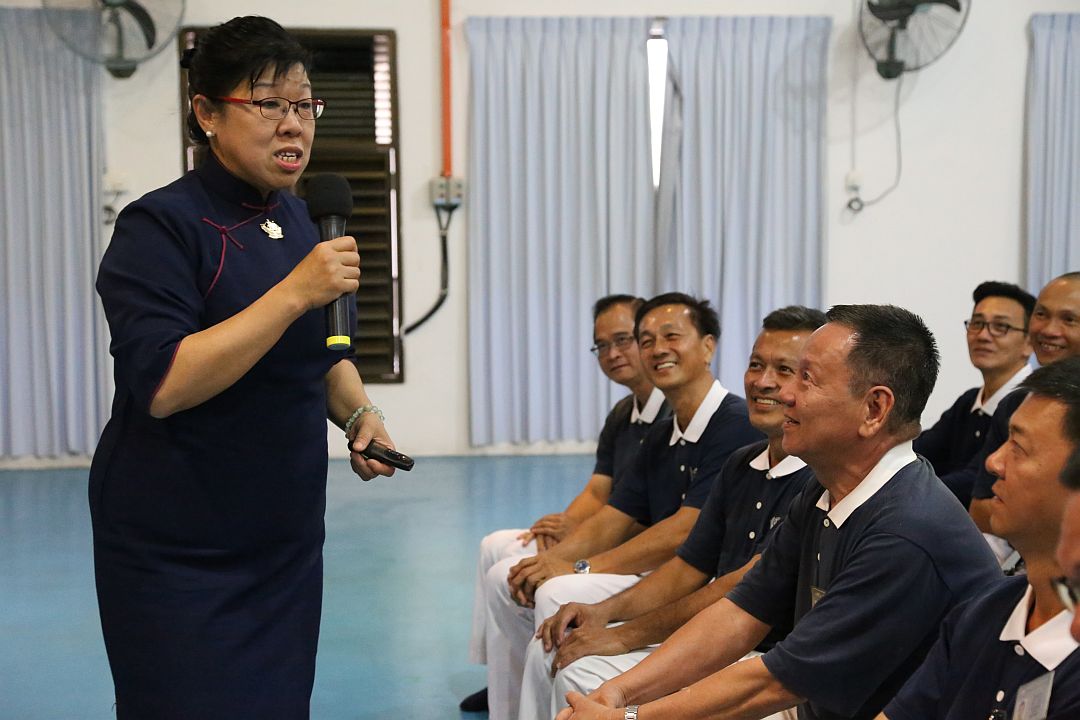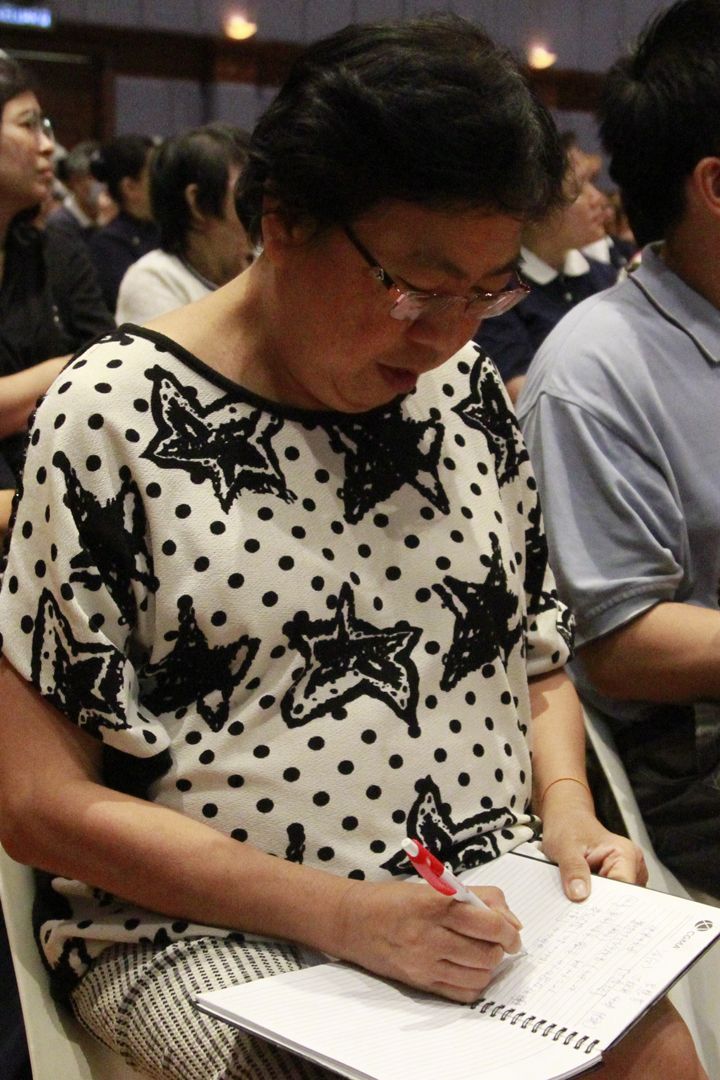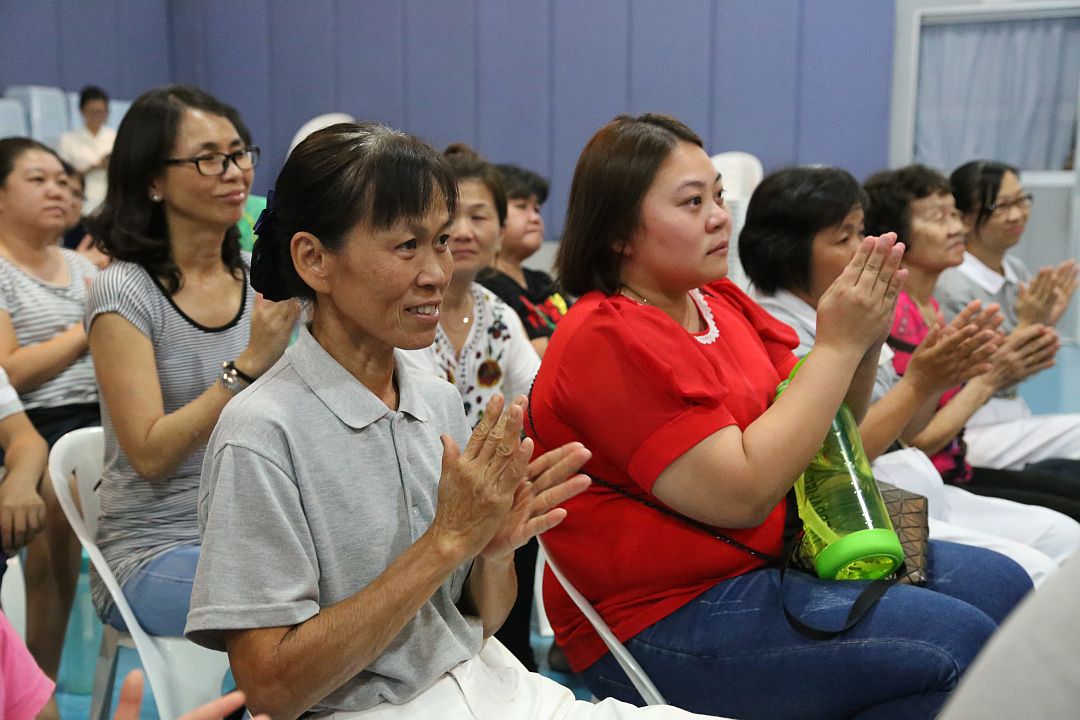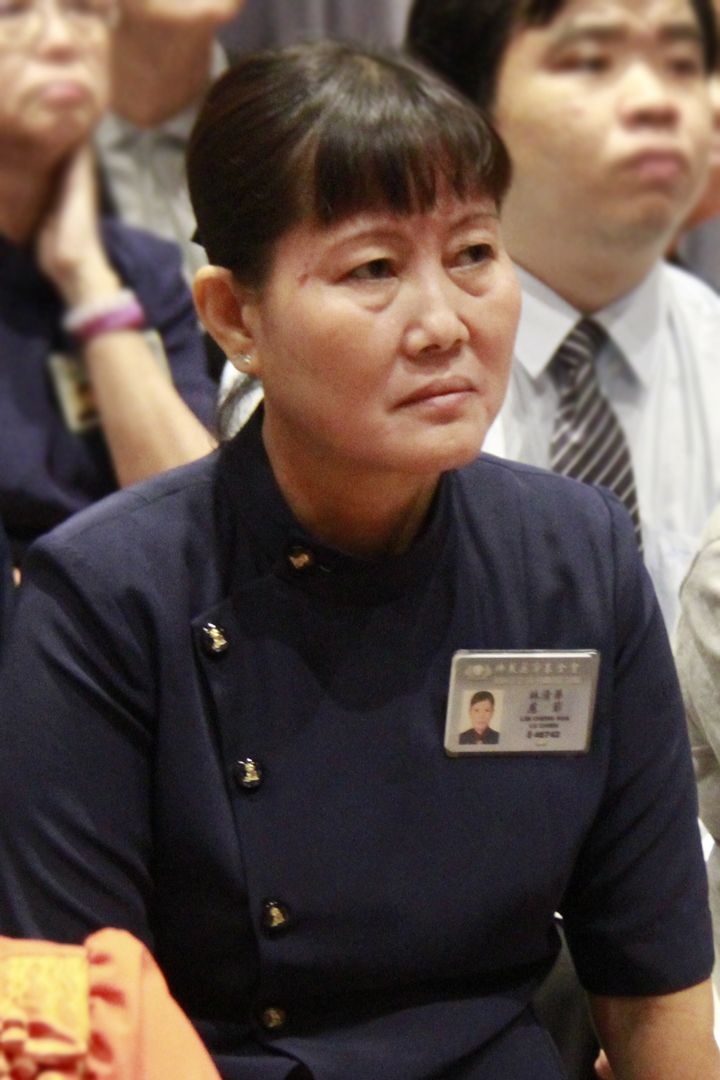Tzu Chi volunteer, Ding Lin Cai had a difficult childhood. Her father was an alcoholic and a compulsive gambler, who would rather gamble away all his money than to spend it on his children’s education. Growing up in such a hostile environment filled Lin Cai’s heart with not only resentment, but also yearning for a loving family. Yet, luck was not on her side.
“I want to take care of you.”
These words, uttered by an army officer 31 years her senior, convinced Ding Lin Cai to marry him after only a brief correspondence. They had two children together, and Lin Cai was doted on by her husband. She envisioned a rosy life ahead. Unfortunately, she mixed with bad company and followed in her father’s footsteps, giving in to alcohol and gambling, and returning home drunk after every drinking session.
Tzu Chi Taiwan volunteer, Ding Lin Cai visited the Malacca Tzu-Chi Jing Si Hall and the Tzu Chi Bakri Activity Centre in Muar on March 1 and 2, 2019 respectively, to share her thoughts on the topic of “Cultivating Positive Affinities with Love”, with the hope that her story would inspire the 550-strong audience.

Ding Lin Cai candidly shared her personal experiences and insights on life, interspersed with heartwarming, light-hearted moments, as well as tear-jerking anecdotes. [Photograph by Kang Miew Tiang]
Resigning to the laws of karma
Ding Lin Cai has been strong-willed and disliked being told off by others since childhood. She revealed, “Whenever my husband grumbled about my drinking and gambling habits, I would start a quarrel with him. Growing up in such a hostile home environment left an adverse impact on my children. My eldest son picked up my bad habits.”
Lin Cai’s eldest son started smoking in secondary school and owned six credit cards. After the credit limit of all six cards had been maxed out, he turned to borrowing from illegal loan brokers. He subsequently dabbled in gambling and ended up deep in debt. Faced with the challenges brought about by her son’s negligent deeds, Lin Cai kept her composure and settled her son’s accumulated debt. She even mortgaged their house to pay off the loans. “A child is a parent’s most prized possession,” she sighed, recalling her willingness to cover for her son’s mistakes.
After joining Tzu Chi, she learnt to leave her habitual tendencies and resentment behind, and to be grateful for all she has. She remarked that although she loves her son dearly, her affections were not reciprocated as her son treated her as nothing more than an ATM. She believed that her sons were born with different dispositions, each for a different purpose in her life. One of them is a test for her to practise spiritual cultivation, while the other arrived to pay his filial dues. Faced with the workings of karmic cause and effect, she vowed to herself to readily accept challenges and overcome them with the Dharma wisdom imparted by Master Cheng Yen.
Overcoming obstacles with love and Dharma wisdom
Despite her son’s unfilial ways and the many troubles he had caused, Lin Cai never left his side. In 2018, he was diagnosed with final-stage oral cancer. As the cancer spread aggressively, he lost his appetite, had difficulty sleeping, and developed itchy skin, among other symptoms. During this testing period, Lin Cai cared meticulously for him, but their mother-son relationship became considerably strained. It pained her to see that the suffering her son had to endure made him irritable. However, she learnt to keep her heartache in check and take her son’s frustrations in her stride. She understood that her son’s mood swings were an outlet for his pain, and did not mind being her son’s “punching bag” for him to take out his agony on.
Once, when Lin Cai was tube-feeding his son, he yanked the tube away in repulsion. Lin Cai was so disheartened by her son’s reaction that she ran to the washroom and cried. Although she felt hurt, Master Cheng Yen’s philosophy of “The Three No’s” came to her mind: “In this world, there is no one I do not love, no one I do not trust, and no one I do not forgive.” It suddenly dawned on her that if she was able to tolerate complete strangers, there was no reason why she could not accommodate her own son. Armed with renewed resolve, she wiped away her tears, stepped into the ward, and sought forgiveness from her son for her insensitivity. Her son, in turn, was touched by her unconditional love for him.
Her son’s attitude towards her gradually changed for the better, and the relationship between mother and son had improved over time. Her son once said to her, “Without you, Tzu Chi would not collapse, but I could not survive without you.” Sadly, he passed away just as he started to show gratitude for his mother. The devastation Lin Cai felt over the loss of her son, though overwhelming, was powerless in bringing him back.
Nevertheless, she is grateful to have been able to realize the true extent of her affection for her son. Although her son now lives only in her memory, she eventually managed to convert the negative karmic affinity between them to positive affinity after 41 years of kinship. She is also thankful to her younger son for his kind understanding in tough times. She has also forgiven her eldest son, and feels more at peace with herself – a true reflection of the spirit of being kind to oneself by forgiving others. She reminded everyone not to hesitate in carrying out deeds of charity and filial piety, and to cherish our loved ones.
Meeting a kindred spirit
With a pen and notebook in hand, Tan Jok Puah diligently took notes while listening attentively to the speaker on stage, only stopping to look up occasionally. She finally had the opportunity to meet Ding Lin Cai in person, having watched a drama series chronicling the latter’s ordeal on Da Ai TV. She recalled Lin Cai living by one of Master Cheng Yen’s teachings: “As you seek to counsel others, don’t forget to counsel yourself too.” Upon realizing its true meaning, Lin Cai found the strength to care for her son tirelessly till his last breath.

With a pen and notebook in hand, Tan Jok Puah diligently took notes while listening attentively to the speaker on stage. [Photograph by Tan Yen Pack]
Lin Cai’s story reminded Jok Puah of her own children. Her 18-year-old son is disciplined and considerate. He is currently studying in Taiwan, and would send reminders to Jok Puah to follow through her physiotherapy treatment for her spinal problem, and to not over-exert herself. On the other hand, her 16-year-old daughter is a cause for concern. She has a reckless streak about her, is an attention-seeker, and hardly plays by the rules. Jok Puah is most worried about her daughter’s tendency to coop herself up in her room, limiting all her daily activities to its confines. This spurred Jok Puah to attend various educational seminars with the hope of modelling herself into a positive example for her daughter to emulate.
After listening to Lin Cai’s sharing on how her ailing son reflected upon the story of Master Wu Da, repented his mistakes and engaged in heartfelt exchanges with his mother, Jok Puah gained profound insights on the benevolent power of love, leaving her in awe. “We must acknowledge and cherish our blessings, as well as cultivate more blessings,” she acknowledged.
Learning from experience
At the sharing session in Muar, attendee Koh Su Ping was deeply moved by Lin Cai’s experiences and empathized with her plight. Like Lin Cai, Su Ping’s father was hooked on gambling in his younger days and idled his time away. All household duties were shouldered by Su Ping’s mother and grandmother.
Su Ping respects Lin Cai for being an admirable mother. Parents are always forgiving of their children’s mistakes, no matter how grievous. Yet, Lin Cai took a distinctive approach to parenting by applying Dharma teachings in cultivating her own character and in bringing up her children. Su Ping noted that in the past, her temper would flare whenever her child disobeyed her. But ever since enrolling in Tzu Chi’s Parent-Child Bonding Class (PCBC) with her child, she has gradually learnt how to better communicate with her child.
Su Ping concurred with Lin Cai’s sentiments that charity and filial piety should be prioritized. This virtue has been firmly ingrained in her through her involvement in Tzu Chi. As such, Su Ping would bring her mother along for every Tzu Chi’s activity she participates in. She regretfully admitted her impatience towards her ageing mother’s constant nagging, but she has since resolved to be more patient and attentive towards her mother.
Another attendee, Tey Lay Bee, empathized with the pain a mother has to endure following the loss of her child. Her daughter’s death by illness at 16 months old led her to a deeper understanding of karmic cause and effect. Hence, she constantly reminds herself to commit to charitable deeds and cultivate blessings. At the same time, she encourages her family members to adopt vegetarianism in order to avoid generating negative karma from the slaughtering of livestock.

Tey Lay Bee (1st from left) and her daughter, Law Lilian (2nd from left) aspire to learn from Ding Lin Cai’s example to wean her son off his mobile phone addiction. [Photograph by Kang Miew Tiang]
Lay Bee also mentioned her decision to curb her son’s mobile phone addiction by sending him to board at a Chinese independent school. But now, she is contemplating learning from Lin Cai’s example to wean her son off his addiction through love and tactful communication. Her daughter, Law Lilian, who was seated next to her, said, “We all love the little brother of our family, but in learning the valuable lessons from Lin Cai’s relationship with her son, we realized that my brother’s flawed character serves a purpose – to cultivate our patience.” Lay Bee aspired to take a fresh perspective in her approach to rehabilitating her son, instead of resorting to scolding or nagging.
A blessed encounter with Tzu Chi
Tzu Chi Malacca volunteer, Lim Cheng Hua, commented “I am deeply moved by this sharing session! I have learnt that we have to be tolerant in all we do and believe in karma in order to transform negative karmic affinity to positive affinity. We should treasure every opportunity to give of ourselves, as being able to serve others is a blessing.”

Lim Cheng Hua and Ding Lin Cai have much in common in terms of their experiences in life, and they both learnt to convert negative karmic affinity to positive affinity after joining Tzu Chi. [Photograph by Tan Yen Pack]
Burdened by a husband, who was not gainfully employed and indulged in vices, Cheng Hua’s mother had to raise a family of seven children all by herself. The grit required of such circumstances had likely shaped Cheng Hua’s mother into a strong-willed and quick-tempered matriarch. Cheng Hua confessed that her personality mirrored her mother’s, causing conflicts in her marriage. Cheng Hua and Lin Cai have much in common in terms of family background, personality and their relationship to their parents. Their experiences of impoverished living conditions and the lack of familial support had sown seeds of resentment towards their parents, intensified by their headstrong personality and the older generation’s insistence on conservative values.
Cheng Hua was sent to join a Chinese opera troupe at age ten, depriving her of the warmth of family life. She had been exposed to all sorts of people throughout her 10-plus years in the troupe, and picked up mahjong, foul language, drinking and smoking. She was married off to a groom of her mother’s choice at 25. The couple relocated from Singapore to Malacca and quarrelled frequently, owing to their unyielding personalities and the pressures of settling in an unfamiliar land. Cheng Hua blamed her parents for all the rough patches in her life, from her tumultuous marriage to her illiteracy. Her biggest regret is not having fulfilled her filial obligations to her mother, and also for not respecting her as she frequently raised her voice at her mother.
Cheng Hua’s turbulent relationship with her husband resulted in a hostile home environment for their eldest son, who turned rebellious. “He was tired of his father’s gambling habit and the constant quarrels. His resentment and sense of injustice led him to walk out on the family in a huff,” said Cheng Hua of her son, who returned home three years later. At that time, Cheng Hua had joined Tzu Chi and learnt to communicate calmly with her son. Her son’s attitude towards the family had also changed after witnessing improved relationship between his parents and newfound harmony among the family. Cheng Hua recounted gleefully, “Back then, I single-mindedly demanded my husband to change his ways. But by heeding the Master’s advice to change our ways first before expecting others to change, I managed to keep my family from falling apart.”
Now, Cheng Hua is proud to claim that her encounter with Tzu Chi is the most meaningful blessing in her life. She might be illiterate, but that does not matter. At the very least, she was granted the opportunity to acquaint herself with the Dharma and turn her life around for the better.
•
Lin Cai candidly shared her personal experiences and insights on life, interspersed with heartwarming, light-hearted moments, as well as tear-jerking anecdotes. The encouraging reception by the audience motivated her to continue sharing her stories in Taiwan and beyond, hoping to spread positive vibes and inspire others with the capacity of love to mend strained relationships.


